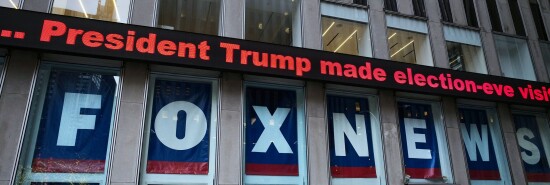
First Amendment should protect Fox News from defamation lawsuit
Quin Hillyer
Video Embed
In Fox News’s defense against the well-publicized defamation lawsuits by voting machine companies, Fox needs to remind a jury that there’s a large distinction between what is unethical and what is illegal.
If Fox eventually needs to appeal an unfavorable jury decision, the network should freely acknowledge that many of its shows are opinion rather than news because libel law gives more protection to opinions.
DEMOCRAT BLAMES FOX NEWS FOR BALTIMORE’S FAILING SCHOOLS
Better yet, Fox and the machine companies could reach a settlement whereby Fox apologizes for bad judgment in broadcasting unfounded aspersions and perhaps pays some damages (far less than the companies are demanding) but acknowledges neither malice nor actual legal violations.
In sum, Fox probably needs to swallow some bitter pills. Still, the network has a stronger legal-constitutional case against the defamation case than most news coverage right now is admitting. And if it loses, the erosion of First Amendment press freedoms could be baleful for the republic.
To repeat: Even for those of us emphatically on the record blasting former President Donald Trump’s lies that the 2020 election was fraudulent and who have little sympathy for anyone who abetted those lies, Fox’s First Amendment claims should be respected.
If legal push comes to constitutional shove, Fox probably ought to win.
First, it would be ludicrous to deny that numerous personnel at Fox practiced unethical journalism in the wake of the 2020 election. They did so by effectively amplifying the false claims that the Dominion and Smartmatic companies helped or allowed the election to be rigged against Trump. There’s no need to rehash the evidence, which has been plastered all over the news for weeks. When a top network star urges that a reporter be fired because she dared conduct an entirely accurate fact check that happened to anger viewers, that’s unethical.
Bad ethics, though, does not necessarily equal libel or legally actionable defamation. Although not every tittle of jurisprudence built around the famous 1964 case New York Times v. Sullivan is (strictly speaking) textually constitutional, its essential holding does reasonably apply the intent of the First Amendment. To wit, because “it is ‘a prized American privilege to speak one’s mind, although not always with perfect taste, on all public institutions,’” the amendment correctly “‘presupposes that right conclusions are more likely to be gathered out of a multitude of tongues, than through any kind of authoritative selection.’”
The court thus ruled that only “actual malice” shown by “reckless disregard” for the truth qualifies as actionable defamation against a public figure. At least since the disputed 2000 election between George W. Bush and Al Gore, it has been obvious that any company providing election systems is inherently making itself a “public figure” in effect. Moreover, an opinion outlet or show giving airtime to public figures, Trump’s lawyers and advocates, to make claims about an item of public concern, such as a voting system, is far different from a show stating as fact that the claims are true.
The companies’ lawsuits do delve into numerous reasons why knowingly allowing false allegations to be aired can amount to endorsing the falsehoods. Still, in every instance, those claims were being reported by every national news outlet anyway, in some form or fashion, because claims by representatives of the president of the United States are, by their very nature, newsworthy. And Fox’s opinionators are, like all opinionators, allowed broad leeway to interpret and craft how they present that which is demonstrably newsy.
Moreover, Fox on numerous occasions invited Dominion officials on the air to refute Trump’s allegations, but Dominion declined. Actual malice is hard to prove when the news outlet has offered airtime to the supposed victim of the malice.
With electronic media allowing for tens of thousands of news-related sites to contend for public attention, ample opportunity exists for a public figure or organization to get its message out. As Thomas Jefferson said, the heavy hand of government should be willing (except in extremis) to “tolerate any error so long as reason is left free to combat it.”
That is the essence of the First Amendment: free, unfettered exchange of facts, views, theories, and counterclaims.
The claim by Trump and his advocates that the election was stolen was not just a lie but a damnable one. Certain people at Fox News allowed them to repeat the lie even after recognizing its untruth. Still, they never presented the lies as if they were definitely facts. That’s why the election system companies were wronged but probably not illegally defamed.
